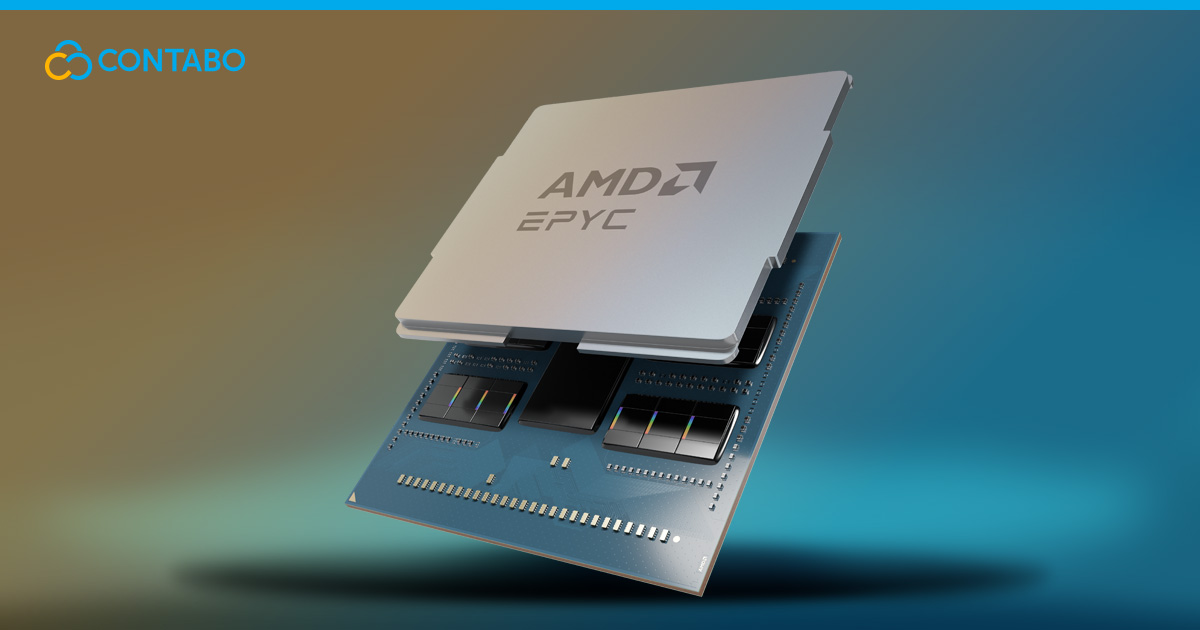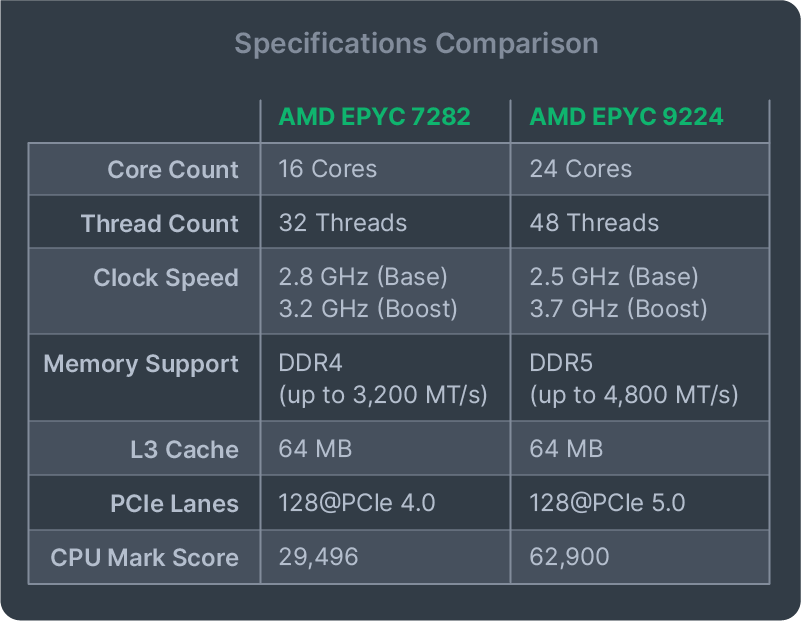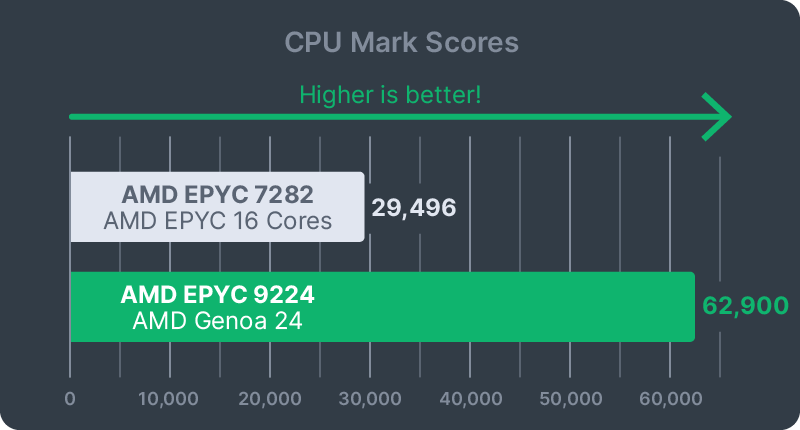
As announced in our previous blog post, August 2024 brings with it a complete revamp of our Dedicated Servers offer. We’re proud to bring you a new cutting-edge yet highly affordable 4th-generation AMD EPYC 9004 series processor (codenamed GENOA). You’re invited to join this new era of ultra-modern cloud computing at Contabo!
New Bare Metal Powerhouse: the AMD EPYC 9224 (AMD Genoa 24)
We’ve introduced AMD’s EPYC 9224 Genoa series processor to our Bare Metal servers under the product name AMD Genoa 24. This addition marks a leap forward when it comes to performance, efficiency, innovation, and security. Let’s look at this new processor in detail to learn how it stands above the rest in its class.
AMD EPYC 9224: The 24-Core Juggernaut
Raising the bar for what a CPU of this core count is capable of, the EPYC 9224 features a 24-core and 48-thread setup. With a base clock speed of 2.5 GHz and boost clock speed of up to 3.7 GHz, it handles most demanding tasks. This includes High-Performance Computing (HPC) and Artificial Intelligence (AI) / Machine Learning (ML) environments, where handling simultaneous processes is critical.
Right off the bat, a high core count and multi-threading capabilities translate to better performance in high-load situations. This makes the CPU ideal for applications like virtualization and large-volume data processing as well as training intricate neural networks. The EPYC 9224 is also good for handling complex computational tasks such as natural language processing and computer vision.
The EPYC 9224 focuses on balancing processing power with energy efficiency, ensuring optimal performance without unnecessary energy expenditure. A TDP of 200W is an impressive achievement for a processor of this core count and clock speed. The capabilities of the EPYC 9224 make it the ideal choice for our new high-end Dedicated Server, the AMD Genoa 24.
AMD Genoa’s Quantum Leap in Performance and Efficiency
The introduction of AMD’s 4th-Generation EPYC processor (codenamed GENOA), namely the EPYC 9224, marks a significant leap forward. This processor is a testament to AMD’s commitment to innovation. It’s also a clear indicator of its edge over Intel CPUs in terms of performance, efficiency, and security. Let’s have a look into the key features and capabilities of the AMD EPYC 9004 series and underscore why it is the preferred choice for high-performance computing applications.
Enhanced Memory Capabilities
The EPYC 9224 model brings revolutionary changes to memory capabilities with its DDR5 memory support. This enhancement allows speeds of up to 4800 MT/s, significantly boosting memory bandwidth and efficiency. With the capability to manage up to 6 TB of RAM, this processor is uniquely suited for massive data sets. This is a critical requirement in fields like scientific research, enterprise analytics, and machine learning.
Paramount Security
The EPYC 9224 addresses the security topic with AMD’s Infinity Guard. This suite of advanced security features includes Secure Encrypted Virtualization and Secure Memory Encryption, offering robust data protection.
Energy Efficiency and Sustainability
The AMD EPYC 9004 series exemplifies energy efficiency with significantly lower power consumption compared to previous generations. The 200W TDP, achieved through advanced manufacturing and architectural improvements, is especially advantageous for data centers. The efficiency boost reduces operational costs and environmental impact. This aligns with the growing focus on sustainability in the cloud hosting industry.
Versatility in Application
The 24-core 9224 processor is notable for its versatility, and is adept at handling diverse applications. These range from running ERP systems and managing large databases to supporting high-traffic websites and complex e-commerce platforms. Its robust performance is also ideal for Artificial Intelligence (AI), Machine Learning (ML) and High-Performance Computing (HPC) environments, facilitating tasks like training neural networks and processing large datasets in machine learning models.
The GENOA Series: A Milestone in Computing
The EPYC 9004 series offers many advantages and improvements when compared to our previous mainstay, the AMD EPYC 7282, including:
- Groundbreaking ‘Zen-4’ 5nm architecture, which contributes to a remarkable 45% increase in integer and 73% more floating-point performance per core.
- Up to 2.7x more energy efficiency in terms of performance per watt.
- Enhanced security features like 256-bit AES-XTS encryption, establishing new benchmarks in data protection.
Evaluating this processor against the older EPYC 7282 underscores the substantial advancements this new CPU can offer you. As you can see, the new EPYC 9224 takes our Bare Metal lineup to new heights.


As the above comparison shows, the transition from the EPYC 7282 to the newer 9224 model represents a major improvement. With this change, our Dedicated Servers empower you to run more demanding applications with greater efficiency.
Moreover, the energy efficiency of the EPYC series is not just a win for operational cost savings. It also aligns with important environmental sustainability goals. By consuming less energy for higher performance, these processors reduce the carbon footprint of our server operations.
As an added bonus, an expandable 1 TB drive is now included by default with all our Dedicated Servers. This gives them even greater value and ensures plenty of storage for your projects. All drives can be expanded up to 3.8 TB NVMe / 4 TB SSD, or 16 TB HDD (AMD Ryzen 12 only).
AMD Ryzen 9 7900 vs EPYC 9004 Series
Our new Bare Metal lineup includes both the AMD Ryzen 9 7900 and the AMD EPYC 9224. Let’s compare these two powerful processors to understand their performance differences and identify suitable use-case scenarios for each.
EPYC 9004 Series: Tuning for AI, ML, and HPC
The AMD EPYC 9004 series processors represent a groundbreaking advancement in computing, particularly for specialized applications like Artificial Intelligence (AI), Machine Learning (ML), and High-Performance Computing (HPC). This series stands out for its exceptional capabilities in these demanding fields. If you want to learn more about tuning EPYC 9004 servers for AI and ML applications, read AMD’s official Tuning Guide.
Performance and Use-Case Scenarios
AMD Ryzen 12 Use Cases
Web Hosting Services: The Ryzen 9 7900, with its balance of single-threaded and multi-threaded performance, is perfect for web hosting applications. It can efficiently manage multiple websites, handle web traffic spikes, and support backend databases, all while maintaining consistent performance.
Application Development and Testing: This processor is also suitable for development environments where multiple applications need to be run and tested simultaneously. Its ability to efficiently handle multiple processes makes it a good choice for software development companies.
AMD Genoa 24 Use Cases
Advanced Virtualization: The EPYC 9224 is highly capable of managing advanced virtualization environments. It can support numerous virtual machines or containers, making it ideal for cloud service providers and enterprises with extensive virtualization needs.
Data Analytics and Business Intelligence: The AMD Genoa 24 is well-suited for data analytics platforms that require processing large datasets and running complex queries. Its robust computational power makes it perfect for businesses that rely on real-time data analysis for decision-making.
High-Performance Computing (HPC): The 24-core EPYC 9224 is a powerhouse for HPC applications. It’s capable of handling demanding tasks like scientific simulations and large-scale computational research in fields such as astrophysics, climate modeling, and bioinformatics.
AI/ML Model Training: For AI and ML, especially in training large and complex neural networks, the EPYC 9224’s high core and thread count, along with its advanced memory capabilities, make it exceptionally proficient. It can significantly reduce the time required for training models in deep learning and other computationally intensive AI tasks.
So… Which is the Best Dedicated Server for Your Needs?
Choosing between the AMD Ryzen 12 and the AMD Genoa 24 involves several key factors that must be taken into consideration:
- Specific Application Needs: The AMD Ryzen 12, with Ryzen 9 7900 processor, is a versatile choice for a wide range of server applications, especially where a balance of single and multi-thread performance is needed. The AMD Genoa 24 is more tailored for specialized, high-load tasks.
- Scale and Intensity of Workload: For moderate workloads and a variety of general server tasks, the AMD Ryzen 12 is highly effective. In contrast, the AMD Genoa 24 is better suited for high-intensity, data-heavy environments.
- Budget Considerations: The AMD Ryzen 12 is a more cost-effective solution for businesses with moderate performance requirements. The AMD Genoa 24 represents a higher investment for top-tier server performance.
Final Considerations
The introduction of the 4th-generation AMD EPYC 9224 GENOA-series processor brings our Bare Metal servers to the forefront of modern cloud computing requirements. This new offering optimizes performance, efficiency, and scalability, catering to a wide range of your computing needs.
The AMD Genoa 24 Dedicated Server, with its impressive core count and advanced memory capabilities, provides a substantial boost in multi-threaded processing power. This enhancement is particularly beneficial for intensive applications in AI, ML, and HPC, where handling large data sets and complex computations is critical. We hope this new Bare Metal powerhouse will empower you to build even bigger and better projects on the Contabo Cloud!
